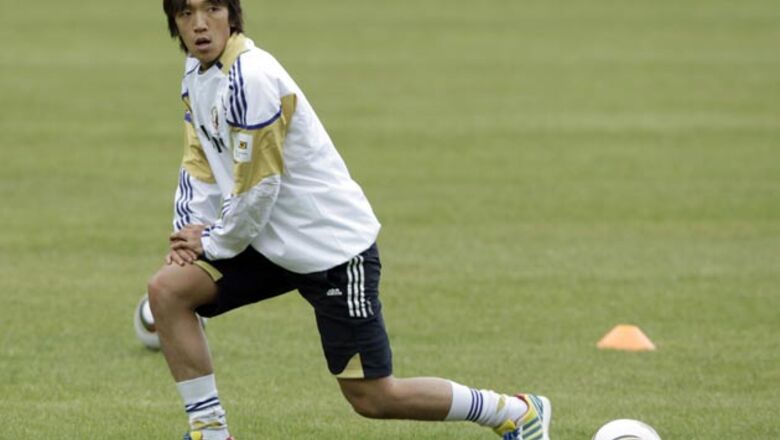
views
Tokyo: Japan have never won a football World Cup game on foreign soil but that hasn't stopped coach Takeshi Okada from setting a lofty goal for his team at the 2010 World Cup - the semi-finals.
"I said I wanted to shock the world. If South Korea reached the semi-finals (in 2002), then why can't we," Okada said shortly after the draw, which pitted the Samurai Blue against 1974 and 1978 finalists Holland, Euro 1992 winners Denmark and four-time African champions Cameroon.
"We will never change our last four target, regardless of the opponents. Our ambition does not just come from me but from all the players and staff. We have prepared against European teams for a long time and we are determined to defeat them. So this is not too bad a draw and it provides us a chance to realise our goal."
To get to South Africa, the Japanese won their third round group, with only a loss to Bahrain. In the fourth and final stage, they beat Bahrain twice and held Australia to a scoreless draw at home before losing 2-1 in Melbourne to finish second behind Australia.
Okada and his men are definitely reaching for the stars, especially considering Japan lost all three first round matches at their World Cup debut at France 1998 and gained just a point from a scoreless draw against Croatia in the opening stage of Germany 2006.
In between, the 2002 co-hosts rode the wave of optimism to a draw against Belgium (2-2) and victories over Russia (1-0) and Tunisia (2-0) before bowing out to Turkey (0-1) in the Round of 16.
Still, Japan have been able to establish themselves as a team that is always around - reaching their fourth consecutive World Cup. And even though a majority of Okada's squad is Japan-based, the country has seen more and more of its top players head to Europe and become mainstays at strong clubs.
After the retirement of veteran midfielder Hiedtoshi Nakata, Japan's biggest star is midfielder Shunsuke Nakamura, who moved from Celtic to Spanish side Espanyol. Young left-footed midfielder Keisuke Honda has excelled at CSKA Moscow and Makoto Hasebe helped VfL Wolfsburg to the 2009 German Bundesliga title.
Also in Europe is Daisuke Matsui at French side Grenoble while Junichi Inamoto has returned to Japan after more than eight years in England, Turkey, Germany and France.
Japan's long time scoring struggles may have been resolved with striker Takayuki Morimoto, who has drawn rave reviews for his play at Italian Serie A side Catania.
A couple of the strongest home-based players are 31-year-old defensive rock and captain Yuji Nakazawa; defensive midfielder Kengo Nakamura, who models his game after former Barcelona great Pep Guardiola; and 24-year-old striker Shinji Okazaki, who tallied 16 goals in his first 24 caps.
Okazaki may need to continue that hot rate for Japan to reach their lofty goal.
The coach: Former international Takeshi Okada took over the national team after Croatian Ivica Osim suffered a stroke and could no longer continue as national team coach. Okada, who won the J. League and the Asian Club Championship as coach, was also in charge of Japan at the 1998 World Cup finals, when they lost all three games. He is considered one of the country's top strategists.
The star: Although heading towards the end of his career, Shunsuke Nakamura still remains the best-known current international. The 31-year-old, who until recently played for Espanyol in the La Liga before moving to Yokohama Marinos after not getting playing time in Spain. He can also look back at successful stints with Serie A club Reggina and Scottish giants Celtic.
He is the top scorer amongst Japan's current crop of internationals, having scored 24 goals in his 93 games and he is now hoping to be able to get his 100th cap at the World Cup finals in South Africa next year.




















Comments
0 comment